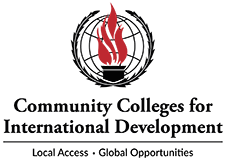USAID PARTNER

CCID and USAID Partner to Advance International Career Technical Education
Washington, DC, March 6 – Community Colleges for International Development (CCID) member institutions will have access to learning opportunities, internships and programs thanks to an agreement with U.S. Agency for International Development (USAID) signed during the 48th Annual CCID Conference, Hilton Head Island, South Carolina.
The agreement, known as the International Career Technical Education Partnership for the Future, recognizes CCID-USAID mutual strategic aims in strengthening local and global workforces through training while advancing U.S. global interests. The new agreement focuses on educational objectives aligned with changing needs for skills aligned with key evolving sectors of the global economy including:
- Artificial Intelligence
- Green-skilling
- Public service and international affairs
- Environmental and social sustainability
In addition, the agreement provides opportunities for formerly incarcerated students, Internships with USAID hosted programs, virtual education programs aligned with Career Technical Education (CTE) and Technical and Vocational Education and Training (TVET), both with USAID in Washington and with USAID missions and comparable educational institutions abroad.
“CCID and USAID recognize the importance of educational institutions, but particularly U.S. community, technical, and vocational colleges, as a primary resource responsible for workforce development and service to both urban and rural communities,” said Dr. Karen McBride, CCID Executive Director. “Similarly, our community, technical and vocational counterparts abroad train an ever increasing percentage of their respective countries workforces to meet rapidly changing demands of local economies, global security threats, weather extremes, digitization, and technology and more.”
According to McBride, nearly half of the current U.S. workforce has attended a community college.
"Community colleges have been drivers of local workforce development for the past century, specializing in technical skills such as welding, manufacturing, agriculture and construction while expanding upon more traditional curricula in business, science and the arts, “ she says. “Their affordable, open-access model is a big reason for U.S. sustained social mobility and economic stability.”
“This affordable model now extends to the global marketplace for learning and workforce development. U.S. community colleges not only reflect this trend but they continue to evolve, adding to their academic strengths through innovating teaching important to keep the classroom experience relevant to today’s needs,” McBride adds. “They also reflect our diverse society and perspectives. We are proud to partner with USAID to accelerate their global reach, creating new partnerships with similar institutions across borders and addressing the nation, and the world’s, most pressing challenges.”
According to USAID Counselor Clinton D. White, USAID has a long history of working with institutions of higher learning, but more recently has sought to increase such engagement as part of a renewed commitment to a broader partner base and promoting a next generation of development professionals.
“USAID higher education programs have led to increased food yields, development of new vaccines, encouragement of entrepreneurship and much more,” White says. “So, we know their value as a means to prepare the global workforce for new job opportunities connected as they are to a changing economy, GDP growth and reduced poverty. We expect this partnership with CCID and its member institutions will benefit their students as well as help us to achieve our development goals. It’s a win-win.”
CCID is a non-profit, membership-based organization comprising a global network of community, technical, and vocational institutions dedicated to advancing internationalization initiatives at the collegiate level.
USAID leads the U.S. government’s international development and disaster assistance through partnerships and investments that save lives, reduce poverty, strengthen democratic governance, and help people emerge from humanitarian crises.
#####
